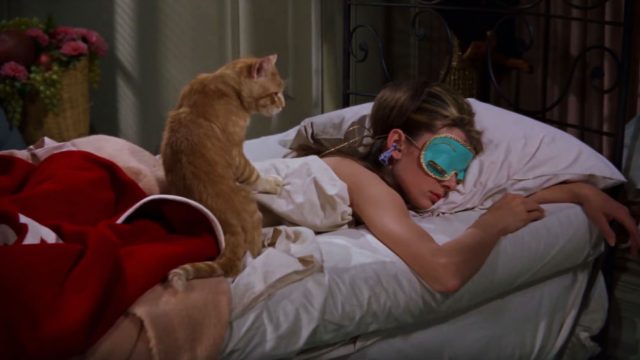Happy May Day, one and all! It takes extra math to figure out the length of the Maypole ribbons so dancers can stay six feet apart, but at least the tradition of leaving items on the porch after ringing the doorbell and running remains strong. Since we’ll want to get outside before it gets too hot or cold (The Solute is proudly bihemispheric), this week’s FAR has several short hits for your perusal.
Thanks again to Miller for his assistance. Send articles to be featured next week to ploughmanplods [at] gmail [dot] com, discuss and post other articles from this past week below, and have a Happy Friday.
Dan Salitt for Filmmaker Magazine covers the life and times of Orangey the Cat(s?):
The above filmography suggests that Orangey is the Brando of cats, containing multitudes. One couldn’t easily predict that the chill, Zen-like animal in Stranger on Horseback would turn in a perfectly villainous and rather by-the-numbers performance two years later in The Incredible Shrinking Man. And nothing prepares one for the naturalism of Orangey’s Everycat in Breakfast at Tiffany’s, as focused on the minutiae of survival as the protagonist of Bicycle Thieves. (Orangey benefits here from the direction of Blake Edwards, who characteristically places the cat in droll long-shot compositions that enhance the comic and kinetic aspects of the performance.)
During the six years I spent financing the movie with Kenji Yamamoto, my husband and filmmaking partner, I ran into plenty of sexism — sometimes blatant, but more often veiled. But I’d proven myself in a far more macho and male-dominated world. I saw show business folk as soft, desk-bound city types who couldn’t rope a calf to save their lives. It never occurred to me that breaking into the film industry would be harder than breaking a horse. I was wrong.
Anything that involves leaving your living room involves taking a chance, and I can’t be the only one yearning for some unpredictability right now. One of my favorite things about going to the movies—after decades of doing it, even as a professional—is being part of the crowd spilling out afterward. I love hearing the arguments, the passionate defenses and attacks, the comparisons to other things that were better or worse. I love the anxiety of people who have gone to see a movie on a date: It was her choice; did he like it or suffer through it, and how does he let her know? I love it when little kids pour out of a theater, completely excited about having had a day out at the movies, even as I see their parents toting up how much the whole experience cost.
Once, while hammering loonies into the digital jukebox to cue up my go-to Jenny’s soundtrack (usually just a loop of “Cowboy Song” by Thin Lizzy, Steve Earle’s “Copperhead Road,” and Willie Nelson’s “City of New Orleans”), some young men from the suburbs galumphed in and ordered some beers. They were instantly in the thrall of the place, in that way that young men (late-teens, early-20s, legally allowed to drink, if just barely) often are, all, “Woah-ho! Now this is a real bar!” These thirsty young saplings were, to me, an old and grouchy man, very tiring. But they were not wrong. Jenny’s is the sort of establishment that caters to no particular taste or trendy concept of what a bar is, that aspires to nothing in particular, and just is. I love it without qualification and I worry about it more every day.
To that end, there’s something to be said for a woman-helmed film that casts an inquisitive eye towards entitled men who are rarely told “no,” and the women who are left in their boozy wake. The grit and violence is not glorified; there’s no Goodfellas sense that “As far back as I can remember, I always wanted to be a gangster.” Rather, Mikey and Nicky are war-weary, at times tired of their own crap. They are as vain as the mob wives portrayed in the genre pictures of yesteryear, while the actual wives and molls of the story are left to make the best out of the cards they are dealt.
In the Shadow of the Guillotine. The Murderous Corpse. The False Magistrate. The titles are as macabre as the masked madman that appears in them. From the publication of his first adventure in February 1911, the character of Fantômas seemed tailor-made for the movies.

